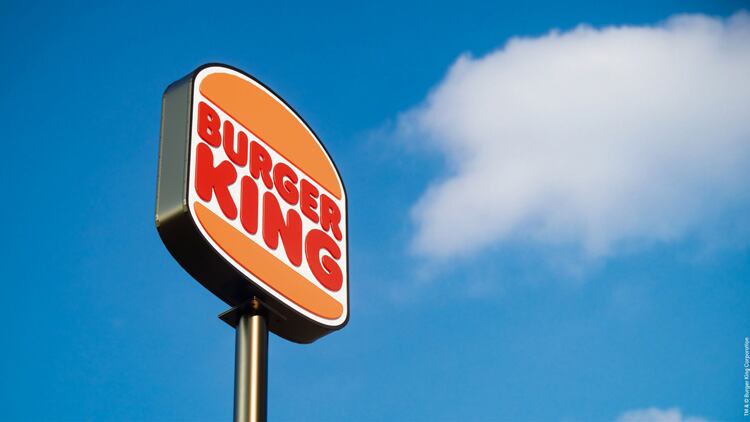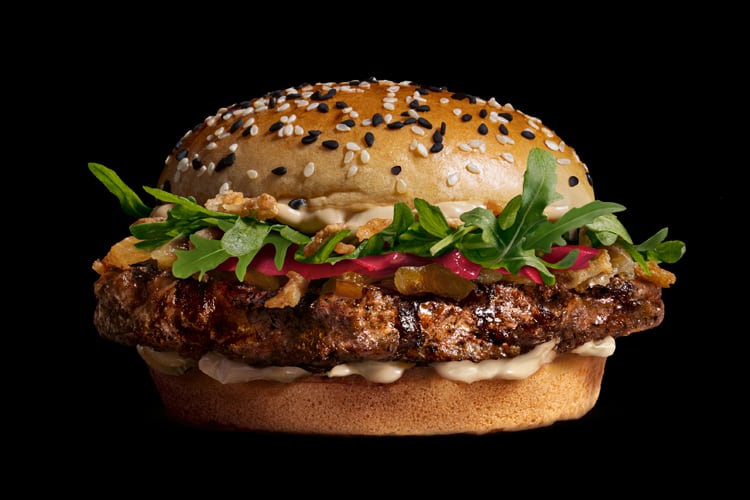“This burger is about setting us apart from the competition,” says Christian Binney, director of food development at Burger King UK, from the kitchen of the fast food giant’s flagship restaurant on The Strand in London. During a normal service, orders for Whoppers, Chicken Royales and Bacon Double Cheeseburgers would be flying out, But on the day we visit, the kitchen is closed to the public and there’s just one item on the menu: The Wagyu.
Binney describes the new burger, which features a patty made with 100% British beef from grass-fed herds of crossbred British wagyu cows, as ‘a true innovation’.
“The Wagyu is our most premium burger to date,” he says. “From the dedicated farmers raising wagyu herds, to our restaurant teams perfecting the flame-grilled taste, it has been crafted with expertise at every stage.”
Available from this week across Burger King’s circa 600 UK restaurants, The Wagyu is the latest edition to Burger King’s Gourmet Kings range, which it launched in 2021 as a more premium counterpoint to its wider offering. At £11, it’s the most expensive burger on the menu, with other Gourmet King items – including the BBQ Steakhouse Angus and Bacon Caesar Angus – priced between £9 and £10.
Keen to emphasise the significance of the product, Burger King has even brought in Gordon Ramsay to endorse it; although, crucially, the chef has had no involvement in the burger’s development. Ramsay, who is reportedly being paid a six-figure salary for his troubles, is front and centre of The Wagyu’s marketing campaign, which includes a series of TV adverts entitled ‘Not Made By Gordon’ that see him try to involve himself in the making of The Wagyu burger.
Ramsay’s presence is notable, not least because it marks the first time he has been part of an advertising campaign for a QSR brand. The chef, who is better known for his Michelin-starred restaurants and TV work, has his own more dine-in restaurant concept Street Burger, which has seven sites (with two listed as temporarily closed).

Given his prominence in popular culture right now, landing him is a coup for Burger King UK. Describing the partnership as a ‘collaboration’, Ramsay says his interest was piqued by the wagyu beef itself, which has been sourced from across 700 UK farms.
“I think that was the magnet for me to begin with,” he explains. “When Christian first presented the burger to me, I was blown away. I stand behind great produce. This could never be made possible without the incredible work from those farmers. We have the best Japanese wagyu, or American or French, but to have 100% British wagyu. The proof is in the flavour. The proof is in the burger.”
An increasingly competitive space
The launch of The Wagyu comes amid increasing competition by US-born operators looking to try and dominate the UK’s premium QSR market. Alongside Five Guys, which is generally considered to be at the higher end of the nationwide quick service burger chains, recent years have seen the likes of Wendy’s and Carl’s Jr enter the space, with the latter two both citing Burger King as a prime competitor.
Another brand Burger King could be looking to emulate in the premium space would be the Danny Meyer-founded Shake Shack. Pressure, then, is on Burger King as one of the market’s largest and longest running brands – it first opened in the UK back in 1976 – to take the fight to its growing roster of competitors.
The group certainly has the strong management team behind it. Alasdair Murdoch has led the Burger King UK business as CEO since 2018, after private equity firm Bridgepoint acquired the UK master franchise. Murdoch joined Burger King having previously led Gourmet Burger Kitchen (GBK) for more than half a decade, during which time he helped restore the brand to growth, overseeing close to six years of like-for-like growth at over 5% per annum.

His tenure at Burger King UK so far has seen major changes including its 2021 rebrand, which featured a new, retro-inspired logo – its first in over 20 years – and a broader focus on improved food quality, natural ingredients, and a more digital-friendly experience. It’s a strategy that appears to be working.
Earlier this year, sources close to the company told Sky News it was ‘outperforming’ the wider QSR market in terms of like-for-like sales growth. What’s more, they added that the brand’s Gourmet Kings range has driven sales growth in higher-margin products, while its value platform has also been growing among price-conscious consumers.
An opportunity to capitalise
There’s also, undoubtedly, an opportunity for Burger King to capitalise on the recent downturn of its biggest QSR rival, McDonald’s. Recent years have seen the Golden Arches dogged by troubling headlines and less-than-favourable financial results. The group’s total UK turnover for the year ended 31 December 2024 was down £14m, from £1.835bn to £1.821bn, with gross profit falling from £826m to £825m. An article published by The Telegraph in June described McDonald’s as having ‘lost its grip on Britain’, noting that rising costs and the impact of an ongoing harassment scandal are ‘putting people off their Big Macs’.
McDonald’s itself previously toyed with its own range of more premium – and expensive – burgers in 2015. The Signature Collection featured three burger options all notable for their thicker patties and brioche-style buns. Though originally positioned as a permanent fixture of the menu designed to help the chain compete with gourmet leaning burger chains like Five Guys and Shake Shack, the range was eventually discontinued in 2019 following a slowdown in sales.
In recent years, McDonald’s has doubled down on its traditional positioning as a value driven proposition within the space - though price rises have led to some customer pushback. It’s most recent LTO special the Big Arch places emphasis on its size and calorie count, designed to satisfy ’serious hunger’. Given its own size and scale, Burger King has a strong opportunity to plant its flag as the leading authority in the premium QSR space.
Democratising wagyu
The development of The Wagyu is something Binney and Burger King’s food development team in the UK have been working on for several years, and comes amid a growing consumer demand for premium wagyu beef. Indeed, the number of wagyu-sired calves born in the UK has grown exponentially in recent years. Figures released by the British Cattle Movement Service in 2023 showed that British wagyu more than doubled its numbers in 2023, driven by strong sales in both retail and foodservice.

The burger itself comes served in a seeded brioche bun with a trio of onions – caramelised, pink pickled, and crispy – rocket, and caramelised onion mayonnaise. Presented in a special Gourmet King-branded cardboard box designed to ensure the bun doesn’t go soggy, it certainly has premium appearance. The flavour, meanwhile, hits a neat balance between rich beefy notes, zing from the onions, and pepperiness from the rocket. As Ramsay describes it: “It’s pretty unique. And when you taste it, there’s that moment where you think ‘oh, that’s fucking delicious’.”
Binney is keen to emphasise both the quality of the beef patty and its positioning as a premium, but still affordable product. “Our guests are really interested in provenance and quality, and this is the pinnacle of that,” he says. “We’re looking at how we can answer that guest need, and what better way than celebrating such a fantastic breed of cattle. “That’s what it’s all about for us, almost democratising wagyu and making it available across the country.”

